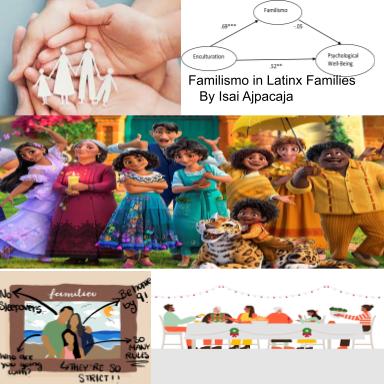Familismo is a concept that is commonly implied in Latinx households. Familismo is a concept “theorized as a core cultural value that requires the individual to submit to a more collective, family-based form of decision making, and responsibility for, and obligation to ensuring the well being of family members” (Martinez 25). FamilIsmo is a cultural practice that emphasizes family first rather than the well-being being of an individual person. In other words, familismo focuses on keeping a balanced family, and maintaining that balance. Children of parents who follow familismo have to sacrifice their dreams and aspirations for their family. They often have to give up their dream colleges, dream jobs, dream careers, and their dream lives to satisfy the needs that their family placed on them.
Familismo should be considered when analyzing data on Latinx students’ school selections because students who are raised in families that follow familismo often don’t get the liberty to go to out-of-state colleges because they would be “abandoning” their families. Most of these students have to go to colleges that are more local to their area because that way they are in contact with their families so they get support from their families and can pursue their education. ” For several students interviewed, choosing the specific college to attend depended on the proximity of the institution from home, partly due to their desire to continue benefitting from their strong familial ties and support while in college.”(Martinzez 28). This quote clearly points out that familismo is a determining factor for why many students choose a specific college. Letting go of family ties is hard because familismo is like a seed that when planted young, can keep growing which only makes it harder to stop. This is why breaking out of familismo is hard because it’s been taught at an early age. This results in why Latinx students choose specific colleges.
The approach that Martinez uses for gathering her data is by interviewing students who identify as Latino to listen to their output on the type of college that they will be attending. To be more specific, Martinez primarily focused on Mexican students since familismo is more common there. Her key research results concluded that students are more likely to choose a specific college because of high connections to familismo . In other words, it can be concluded that Latinx students are driven to choose a specific college not because of their own intuition but rather the influence of their families and the pressures that they have when deciding what college to attend.
My own experience with choosing a college differs a lot compared to the examples provided in the article because fortunately I was not really hit hard with familismo. This is because my father allowed me to choose the school that I wanted to go to. He wanted me to pursue my dreams and aspirations. He wanted me to have the life that I wanted. He did not force me into a specific school or specific major that would only make him happy. He respected my college choice and major and ever since he has done nothing but support me.

Hi Isai,
I really enjoyed reading your response. I can totally relate to your experience. I feel in Hispanic culture their such connection and dependency on one another, at least for me. If one of us is absent, it ruins the family dynamic. However, I do not really see this as healthy because sometimes I feel the guilt of leaving my family if it were to a college out of state. It is not that my parents are stopping me, though they do not want me to leave, it is more of me feeling fear and guilt if I do leave. I know that eventually I will have to move out and start living my own life and in a way, I want to prepare my parents for that. I plan to goo to Japan to complete my masters in Psychology, my mom is not on board with the idea but I feel it would be such a great experience for me. That is physically and mentally.
Hi Isai,
I really liked your intake on familismo and how you analyzed the reading. I especially liked the simile of familismo being like a seed that is implanted on to us from an early age. Like you mentioned, familismo becomes something that is hard to move away from once it becomes a norm within the family and if someone ever tries to do something for themselves, it would be considered as ‘selfish’ or cause some form of guilt (like a betrayal towards the family). Also, I’m not sure if it was intentional or not but I really like how you included the photo of the movie Encanto into your cover art because it really highlights what you said about how children of parents who follow familismo often sacrifice their dreams and aspirations for their family. Like the movie, familismo can also uphold generational trauma and this trauma sometimes becomes this new definition of familismo rather than trying to support each other.